So many questions...so little time!
My main questions would be what the safest smaller city, or outskirts of larger city, is for a single mom and small child. Both safe from crime and natural disasters (I think I'd be too nervous to live right next to an active volcano).
I'd also like to be close to a school where they have both English and Spanish. And, I wondered whether there were any after school activities like sports or other ways to meet friends.
And, I don't know if this is possible, but my son has allergies so we usually get all of our meats now from local "organic" farms who do not use GM feeds. I've heard many blogs say that all the food there is organic, but then I've heard others who say that they feed their chickens, in particular, GM corn from the US and I've even heard that they still use DDT there for a pesticide. This would be an important issue for us. We could live without chicken, but not eggs or beef (though we don't eat much beef)
My income is about $1300 a month, but once my son is 18, it will only be about $950 per month, so that's a consideration too. Perhaps I could start some kind of small business to supplement that, but I don't want to count on that.
I'd appreciate any advice you could give me.
p.s. Has anyone successfully moved their cats there? I hear that can be a problem.
Hi,
We moved to Quito about a year ago and we brought our beagle and cat with us. We did not have any problems however, I have roots in Ecuador so it was easier for me as we already had a vet at the airport to help us out and I know the language so I knew my way around. With that said if you are interested in bringing your cat let me know, I´ll be happy to help you out and have someone meet you at the airport to help you get your cat asap.
In regards to safe place outside the city there are several small towns where you can pick from just depends what you like. It could be Cotacachi in the mountains, Bahia or Canoa area close to the beach, the outskirts of Cuenca have some nice quaint little towns as well. There is a small school in Canoa that is always looking for bilingual teachers I know they pay a very small stipend I believe it is about $300 but could help and they can also help you with very inexpensive accommodations in the area. You can visit the schools website for more information: http://www.jamesdeanbyrdfoundation.org/
Let me know if you need any further information.
Good Luck
Berenice Hutton
The first three piece of advice are 1) Repack 2) Repack 3) Repack 4) don't listen to those who have been there 10 years ago, DO NOT apply. 5) Keep in mind the Ecuadorians are a first generation divers, bee watchful, remember your first car. and finally the cost of living is about even with the states, but the rent is cheaper and you don't have so many temptations to spend money. Make sure that where you want to go is in your age bracket.
berenicehutton wrote:the outskirts of Cuenca have some nice quaint little towns as well.
What are the names of these safe towns near Cuenca?
Hi,
Literally for years I have worried about how to bring my cat south with me (she is the one remaining now and I trapped her as a feral cat 7 years ago, but still is very timid with people). I hope to bring her with some airline from Ottawa, which is in Ontario, Canada. I am taking her to Loja province, to the area of Loja or Malacatos, likely. I hope to make an exploratory trip solo first, before bringing the cat and myself down permanently later this year.
Any hints you could provide would be most welcome.
Helen Pivoine
Hi,
You mentioned quaint towns outside of Cuenca. Outside of Loja and environs, my only other choice is just that. I heard of Giron, but do not know about the others. I am hoping for a warm climate like Loja province, Cuenca is a bit chilly for me (this coming from a Canadian where we get very cold weather in winter).
Helen Pivoine
Yes. DDT is used to combat Mosquitos. For some reason people think that Ecuador is an organic paradise. It isn't. The farmers here use pesticides and GM seeds to increase their yield because they need the money. Most of the farming here is done on small plots, not the mega farms as in the USA and Canada. You can find organic stuff in the supermarkets or mercados, but of course it is more expensive than the other stuff. No Whole Foods here!
cccmedia wrote:berenicehutton wrote:the outskirts of Cuenca have some nice quaint little towns as well.
What are the names of these safe towns near Cuenca?
One might look at Paute and Gualeceo. Paute is very small. Gualeceo has a market each Sunday. In my limited experience both are warmer than Cuenca. And, from what I've read, cheaper. Personally, both bore me to tears. Neither is all that far from Cuenca.
Hi, Helen
Don´t mean to overwhelm you but here is what you need to do in order to bring the cat to Ecuador. We had to do this last year for our cat and dog. While I was doing this process I was writing it down because I figured it would help someone later on with the same situation. I don´t know if there is anyone at the airport that can help you with this process for a fee but I´ll double check and let you know. In the mean time here it is.
The vaccines need to be updated your vet has to fill out an international form and has to have the veterinary clinic´s seal and legal signature. After you have done this you have to take that document to the nearest Consulate of Ecuador to get it legalized and with that documents the animals will be ready to leave the country. You might want to double check with the airline you will be flying in regards to what they as a private corporation require to let the cat onboard. Each airline is different. They also sometimes can refer you to a vet that does the international certificates, their are some specific vaccination you require for Ecuador and the vet should know.
Once you get to Ecuador if you arrive to Quito you will have to do the following process in order to have them release the animals to you:
1. Make a payment of $28 at Produbanco to get the original AWB if they only give you a copy ask them to give you a certified letter indicating it is a true copy of the original AWB (The bank is outside the airport you will have to get a taxi to take you there make the payment and return back to customs)
2. Depending on what airline you arrive you will have to go to the cargo offices which are normally in Tababela and present the original AWB or copy of AWB with certified letter, make sure they also give you a letter stating exactly in what storage number the pets are located. This will make your search a lot easier.
3. Go to the Agriculture Department located in the airport present the AWB with ALL the ORIGINAL HEALTH CERTIFICATES and pet storage number.
4. The airport has a vet on site that will go and visit the pets in the storage area where they are located to make sure they are healthy. ( My nephew is a vet here in Quito and he was friends with the vet on call the night we arrived so we were able to expedite the process with her)
5. Once the vet has seen the pets he or she will give you a release form take these documents to custom agent and present documents given by the vet with original AWB, copy of your passport with the stamp that they place on your passport when you enter the country and proof of airline boarding pass.
6. Custom agent will do a visit and inspection of the pets again. Then they will give you another release form document which you have to take upstairs on the 2nd floor of where the pets will be kept and make a second payment at another Produbanco Office.
And you are ready to get your pets
Pajaroazul wrote:For some reason people think that Ecuador is an organic paradise. It isn't. The farmers here use pesticides and GM seeds to increase their yield because they need the money...You can find organic stuff in the supermarkets or mercados, but of course it is more expensive than the other stuff.
This is an important topic, Blue Bird, and thank you for getting us started.
Some of the strawberries look too large and too perfect, even in some small local "mercados," and I suspect this is one indication that they are genetically modified (GM).
I'm sure you're right: we are blissfully ignorant about "paradise."
This thread is called "So Many Questions" and I have a few:
-- How serious is the situation with GM and DDT and whatever else is being applied to the crops in Ecuador?
-- To what extent is regulation involved?
-- How did you become informed?
-- How can Expats become informed?
cccmedia in Quito, aka "Factotum"
I became informed through a friend of mine that has a working Hacienda in Riobamba. He grows crops as well as raising cattle. He is a gringo, married to an Ecuadorian, who has lived here for 50 years. As we drive around the countryside looking at the farms, he has told me the only way the small farmer can survive is by using pesticides and GM seeds to increase the crop yield. This is necessary for their survival. The people from North America moving here expecting that because of its third world status that the farmers are not using pesticides or GM seeds are dead wrong. It is a matter of survival. Throw away your middle and upper middle class conceptions of the indigenous using Organic farming away when you move here. For the most part, they don't.
I recall seeing labeled "organic" sections at many supermarkets in North America, but not in Ecuador. Please assist us with any knowledge you have about finding the most organic, safe foods possible in EC.
Also, if you or your farmer-friend in Riobamba know or learn about what is being done about keeping our produce "saludable," and who is promoting consumer safety along these lines in any organized way, please let us know.
For this blog, the basic issue here is extremely important -- Expat safety -- so thank you for your eye-opening commentaries.
cccmedia in Quito
In Quito the SuperMaxi on 12 Octubre has a section for organic vegetables. Also, the Friday market behind the Swiss Hotel in Quito, has vendors who say they have organic products, but who knows?
I'll check out the 12 de Octubre SuperMaxi.
I'd consider their organic labeling more credible than the here-today-maybe-gone-mañana "fruteros" behind a hotel.
cccmedia in Quito
Hi Berenice,
My God! Sounds hideous. I am hoping to bypass some of this rigmarole by actually bringing kittie with me on the plane in a soft pet carrier and put her under the plane seat...
Do you know if airlines will let me do that? Of course I will also be checking from this end, just thought that you might know about that stuff.
Many thanks for this technical information!
Helen Pivoine
I think there is very little chance DDT is used anywhere in Equador. Though it is still produced and used in some of the world's worst malaria hot spots, there is a global ban on DDT.
GMO crops are banned in Ecuador. That's not to say that no farmers are using contraband seeds. From what I've seen, a lot of the small rural farms are organic or nearly organic, not by choice, by due to economic realities. A lot of the small farms can't afford pesticides, herbicides, and inorganic fertilizers. The larger more profitable farms often use a lot of pesticides.
Articles to help you in your expat project in Ecuador
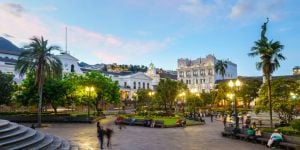
Work in Ecuador
Ecuador is famous as a retirement haven. But you might not want to wait until retirement age to move there and ...
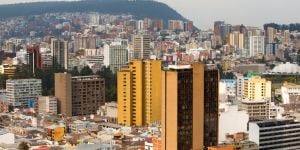
Opening a bank account in Ecuador
A few years back, an expat would just breeze into an Ecuadorian bank, flash their passport and a bank account ...

Healthcare in Ecuador
Ecuador, as a fast-developing nation, has laws that are constantly evolving, but one thing is certain: the ongoing ...
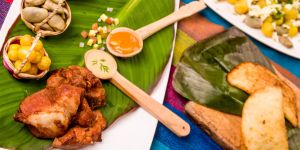
Food in Ecuador
What kind of food will you find in restaurants, cafes, and private homes in Ecuador? Many restaurants in Ecuador ...

Leisure activities in Ecuador
You have made it to Ecuador, now what is there to do in your free time? A lifetime in Ecuador isn't enough time to ...
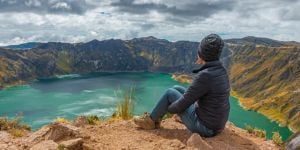
The Working Holiday Visa for Ecuador
Ecuador is truly a paradise for adventure and nature lovers, and thanks to the Working Holiday Visa program, they ...
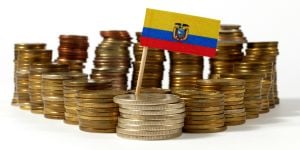
Taxes in Ecuador
The Servicio de Rentas Internas or Internal Revenue Service is the authority in charge of taxes in Ecuador. If you ...
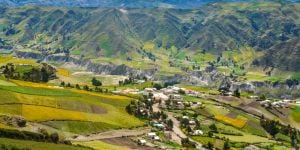
Family and children in Ecuador
Family is everything to an Ecuadorian. The extended family unit is the most important aspect of life in Ecuador, ...
Find more topics on the Ecuador forum



